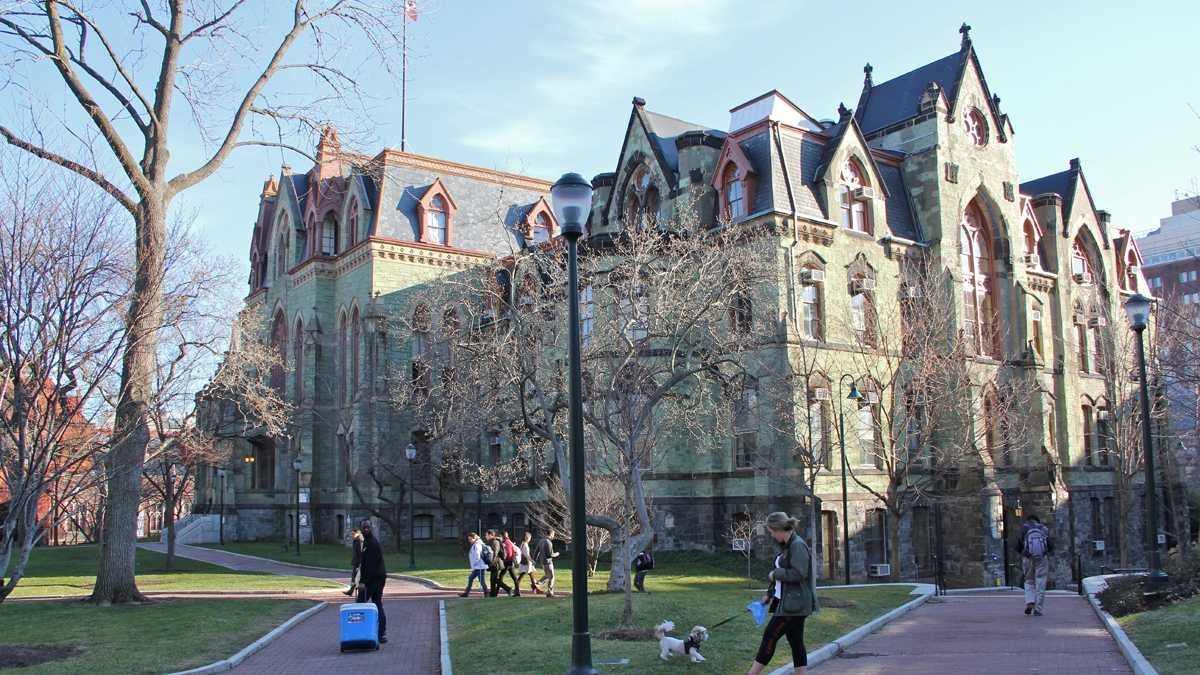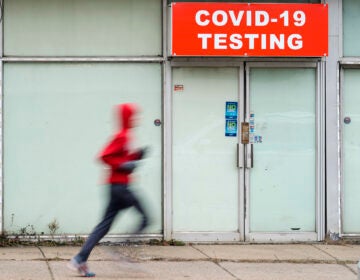Pa. coronavirus recovery: UPenn to move classes online, freeze tuition this coming semester
The University of Pennsylvania announced that the vast majority of undergraduate classes will be online, with some exceptions like clinical rotations for nursing students.

College Hall on the University of Pennsylvania campus. (Emma Lee/WHYY)
Updated at 5:00 p.m.
–
As of Tuesday, August 11, the Pennsylvania Department of Health has recorded 120,281 coronavirus cases and 7,352 coronavirus-related deaths in the state.
The city of Philadelphia has recorded a total 31,584 coronavirus cases, with a total of 1,700 deaths as of Tuesday.
UPenn to move classes online, freeze tuition this coming semester
The University of Pennsylvania announced that the vast majority of undergraduate classes will be online, with some exceptions like clinical rotations for nursing students. Undergraduate students will not live in campus housing, with “very limited exceptions for international students and those students dealing with significant housing or personal hardships.”
The university cites the alarming spread of COVID-19 across the country, saying that it would be untenable to quarantine thousands of students arriving in Pennsylvania, and that COVID testing is still limited and subject to delays. The school had planned to pretest students but has since learned it would not work.
The university also said that it will freeze tuition at last year’s rate, and reduce the general fee for fall semester by 10%. It will credit or refund in full whatever students have paid in housing or dining fees.
There will be no on-campus activities, but performances, academic poster session fairs and orientation activities will move online.
Universities across the region have made similar moves. The University of Delaware will offer most courses online, and Rutgers University froze tuition for the next year and cut a campus fee by 15% after facing petitions, protests, and even lawsuits. Drexel University announced last week that around 80% of classes will be remote, and Temple University announced last month that many classes will be hybrid or online-only.
Pa. company working on rapid DIY COVID-19 test
OraSure Technologies, a medical device company based in Bethlehem, plans to have a quick COVID-19 test you can do yourself by the end of the year.
The idea is to have a test that someone would be able to do themselves and get results quickly, without the need for medical training, access to a machine to interpret results, or time to transport testing materials to a lab. It would tell whether someone had the new coronavirus by testing for antigens, small structures on the surface of viruses.
“Essentially, it’s a lab on a swab,” said OraSure president and CEO Stephen Tang at a press conference.
Tang said the test is in clinical trials now, and the company plans to file for emergency use authorization from the Food and Drug Administration and get it ready by the end of the year. The company is also working on a COVID-19 antibody test that would be done at labs.
The company will get slightly more than a million dollars in state funding because they will expand manufacturing in the Lehigh Valley and create 177 jobs.
A shortage of testing machines and supplies has held up COVID-19 testing in the U.S. Last week, the Pennsylvania Department of Health said the state averaged more than 22,000 test results per day. An NPR collaboration with the Harvard Global Health Institute estimated in late June that Pennsylvania needs to be doing more than 46,000 tests per day to suppress the spread of the virus, keeping infections low enough to open public life again.
Therefore, if the OraSure rapid antigen test works as intended, it “would be a game changer,” said Pennsylvania Health Secretary Dr. Rachel Levine at a press conference.
Pennsylvania Governor Tom Wolf said “we still are looking for that holy grail of fast turnaround time and easy application” and that contact tracing and testing are key for the state.
Stephen Tang of OraSure said the company is aware of how big of a difference a reliable, quick COVID-19 test could make to places like inuring homes, schools, and prisons. He said he has an elderly uncle with special needs in a nursing home who got COVID-19 and has not been able to have visitors.
This would not be the first rapid antigen test for COVID-19. The Food and Drug Administration gave the first emergency use authorization to another rapid antigen test from the San Diego-based company Quidel back in May, but noted that antigen tests have a higher chance of false negatives, so negative results do not rule out infection and might need to be confirmed with another test. Quidel notes that their test does not distinguish between the 2003 SARS coronavirus and the new coronavirus, though there have not been any known SARS cases since 2004.
When asked why OraSure’s test would be different, Tang pointed to the company’s history of making an FDA-approved rapid home test for HIV, and a rapid test for Ebola that the FDA has allowed OraSure to market.
“Unlike most companies who are just getting started in this area of rapid tests, we have products that have been performing for years,” Tang said.
“We’re probably best known as the spit collector company used by companies like 23andMe,” Tang told WHYY’s The Pulse back in May.
Tang said OraSure plans to make the COVID-19 test something affordable that people can buy at drug stores or online, as well as use at medical providers and other places. He noted their HIV test is sold in drug stores for around $40.

Get daily updates from WHYY News!
Philadelphia health commissioner reports “good news” and “progress”
Philadelphia Health Commissioner Thomas Farley said falling case counts and less severe outcomes means “good news over the short term and progress over the long term.”
He reported 145 new cases since yesterday, bringing the total number to 31,584, since the start of the pandemic. He said 59% of the new cases reported in Philadelphia today are people under the age of 40. One more person in the city has died, bringing the total to 1,700.
However, he highlighted that last week, about 4.1% of people tested were positive for the new coronavirus, which is the lowest percent positivity the city has seen yet. Back in March, the World Health Organization said 10% positive is a general benchmark of a place that is doing enough testing to pick up all cases.
Farley also pointed out that the number of severe outcomes has been falling compared to the peak of the pandemic. He said that in late July, less than 100 people were getting sent to hospitals per week for COVID-19, down from more than 800 a week in April. There were four cases reported from nursing homes last week, down from 750 in April. There were eight deaths in the last week of July, down from 250 in April.
He said this means the trends “are in the right direction,” but that everyone should keep wearing masks around other people.
He added there are still problems with tests. He said Quest Diagnostics, which does around 12% of the COVID tests in the city, still has long delays in getting test results back. Quest Diagnostics said their average turnaround time for tests is now two to three days: Other providers, such as LabCorp, have improved their average testing turnaround time from seven days to two days, Farley said.
He warned that people at risk should be more cautious, and that the city will be sending postcards with support resources to around 14,000 people who receive financial aid for durable medical equipment like home oxygen supplies through Medicare, so presumably people who have chronic medical conditions, are older, and are more vulnerable from the new coronavirus.
WHYY is your source for fact-based, in-depth journalism and information. As a nonprofit organization, we rely on financial support from readers like you. Please give today.



![CoronavirusPandemic_1024x512[1]](https://whyy.org/wp-content/uploads/2020/03/CoronavirusPandemic_1024x5121-300x150.jpg)


